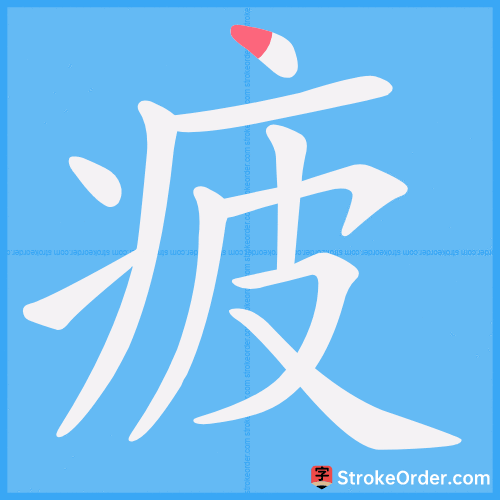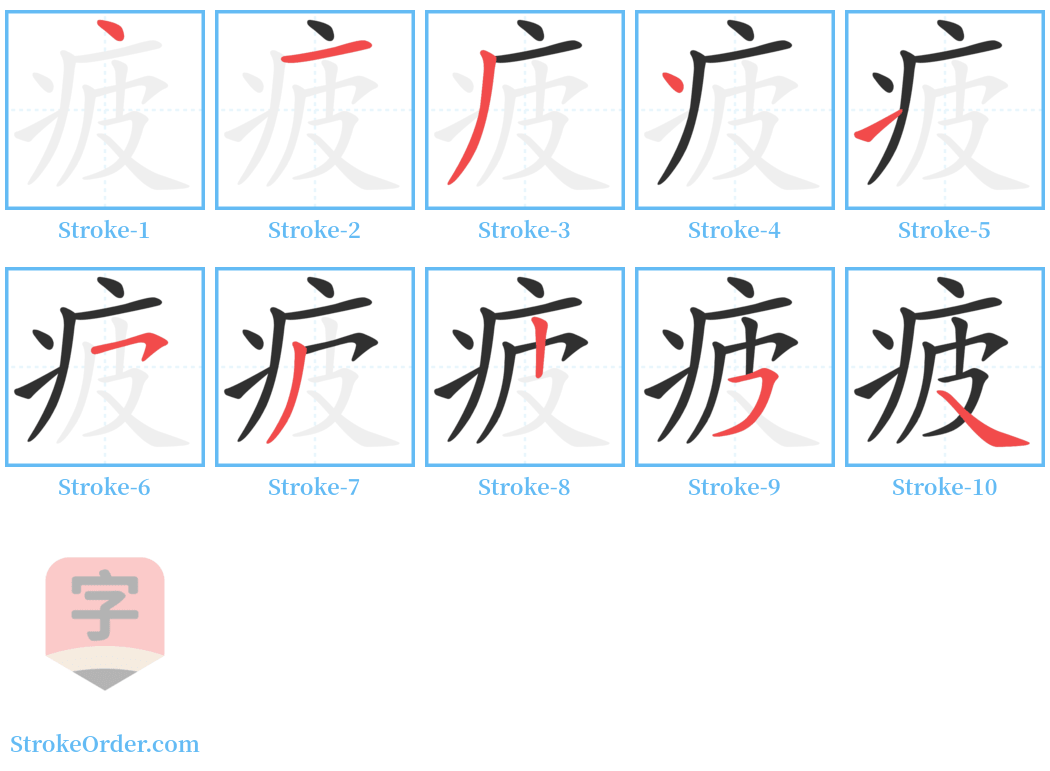疲 Stroke Order
Animated Stroke Order of 疲

Stroke Order Diagrams for 疲

Step-by-Step Handwriting Guide for 疲

Learn to Write Chinese Characters with Video Tutorials
Watch the video of writing the Chinese character "疲", learn the correct stroke order (笔顺) of the character "疲", and master the standard way of writing the character "疲".
Free Printable Handwriting Practice with Stroke Order: 疲
Printable Writing Practice Worksheet of "疲" in Portrait Orientation (Tian Zi Ge)

Printable Writing Practice Worksheet of "疲" in Landscape Orientation (Tian Zi Ge)

Information of 疲
Pinyin
pí
Radical
疒
Strokes
10 strokes
Usage
★★★★★
Definition
weary
疲 [pí]
词性:形
1. 身体劳累的感觉。
(1) Tired feeling in the body.
- 例:疲乏 (tired),疲倦 (sleepy),疲劳 (fatigue),疲惫 (exhausted),疲敝 (drained)。精疲力尽 (exhausted).
2. 懈怠,不起劲。
(2) Lethargy; lack of energy.
- 例:疲塌 (slumped),疲软 (soft/unenergetic)。
引:
1. 《说文》:疲,劳也。
(From Shuowen Jiezi: "Fatigue, that is labor.")
2. 《玉篇》:疲,乏也。
(From Yupan: "Fatigue, that is exhaustion.")
3. 《庄子·齐物论》:苶然疲役。
(From Zhuangzi: "Weariness of labor.")
4. 《淮南子·俶真》:疲马之死也。
(From Huainanzi: "The death of a tired horse.")
5. 《韩非子·初见秦》:士民疲病于内。
(From Han Feizi: "The soldiers and citizens are exhausted internally.")
6. 《资治通鉴》:夫以疲病之卒御狐疑之众。
(From Zizhi Tongjian: "Using the exhausted soldiers to confront the doubtful masses.")
例:
- 精疲力尽 (exhausted), 疲敝 (tired and suffering), 疲玩 (slumped and careless), 疲曳 (weak and tired; metaphorically refers to old age), 疲钝 (feeble and slow), 疲顽 (tired and sluggish), 疲匮 (weary and drained), 疲弊 (suffering from exhaustion), 疲人 (a person in exhaustion), 疲耗 (worn out), 疲匮 (exhausted and in poor condition), 疲羸 (weak and exhausted).
2. 衰老;衰弱。
(1) Weak; in poor health.
- 例:疲癃 (old and infirm or disabled), 疲冗 (feeble and ineffectual), 疲劣 (weak and poor), 疲羸 (feeble).
引:
1. 《管子·小筐》:以疲马犬羊为币。注:“谓瘦也。”
(From Guanzi: "Using tired horses, dogs, and sheep as currency. Note: 'This means thin'.")
例:
- 疲癃 (old and infirm), 疲冗 (feeble), 疲劣 (weak), 疲羸 (weak).
3. 厌倦。
(1) Be bored with.
- 引:
1. 《后汉书·光武帝纪》:我自乐此,不为疲也。
(From Book of the Later Han: "I enjoy this, not because I am bored.")
疲 [pí]
词性:动
1. 停止。
(1) Stop.
- 引:
1. 晋· 道安《鞞婆沙序》:余欣秦土,忽有此经…载玩载咏,欲疲不能,遂佐对校。
(From Jin Dynasty: "I delighted in Qin soil, suddenly there is this text... Engaged in it, but wanting to stop could not, and thus assisted in examining it.")
2. 疲软。
(2) Slump; weaken.
- 例:
如:橡胶期货交易在疲了一阵之后,收盘时又稍稍坚稳了一点。
(Example: "Rubber futures trading slumped for a while, then closed slightly firmer.")
3. 衰败;凋敝。
(3) Decline; depressed.
- 例:
如:疲暮 (old age), 疲老 (aged), 疲瘵 (decline), 疲罢 (exhausted and declining).
whacked to the wide -- terribly fatigued / being fatigued to the extreme / be tired beyond endurance / be tired to death / extremely tired
lit. tired of constantly running for one's life (idiom); terribly busy / up to one's ears in work
Input Method for 疲
Pinyin
pi2
Wubi
uhci|ubi
Cangjie
kdhe
Zhengma
txi
Four Corner
00147
Unicode
U+75b2
Same Pronunciation Characters